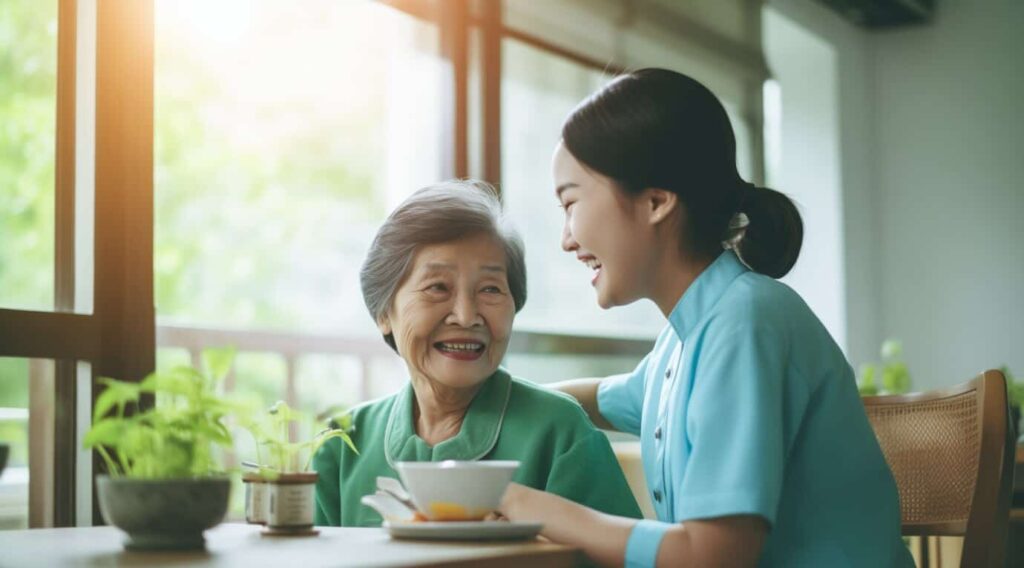Introduction
Aging comes with challenges that often make daily activities more difficult for seniors. While some may rely on family members for assistance, many older adults seek the support of personal care attendants—professionals dedicated to ensuring that seniors maintain their independence, dignity, and quality of life while aging in place.
Unlike the misconception that only celebrities or executives require personal assistants, the elderly also benefit greatly from having a dedicated caregiver. A personal care attendant for the elderly provides vital assistance with daily tasks, making life more manageable and comfortable.
What Does a Personal Care Attendant Do?
A personal care attendant for the elderly may also be known as personal care aides or personal care assistants (PCA). They performs a wide range of tasks to support their clients. These responsibilities often include:
- Personal Hygiene Assistance – Helping with bathing, dressing, grooming, and toileting.
- Meal Preparation – Ensuring seniors have nutritious meals tailored to their dietary needs.
- Housekeeping Tasks – Light cleaning, laundry, and maintaining a safe living environment.
- Medication Reminders – Ensuring that prescriptions are taken on time.
- Companionship – Engaging in conversation, activities, and social interaction to reduce loneliness.
- Mobility Support – Assisting with walking, transferring, and transportation to appointments.
These tasks allow seniors to remain in the comfort of their homes rather than relocating to a nursing home or assisted living facility.

Who Can Become a Personal Care Attendant?
One of the key advantages of hiring a personal care attendant is that many individuals are eligible to take on this role. In most cases, a personal care attendant must:
- Be at least 18 years old.
- Pass a background check and health screening.
- Possess a Social Security number.
- Be able to follow client instructions and routines.
Many home care agencies offer professional personal care service as one of their core flagship services. Interestingly, a personal care attendant can even be a family member—excluding the spouse or parent of a minor—who steps into the role to provide care while receiving compensation for their work.
How Personal Care Attendants Enhance Independence
While personal care attendants perform many essential duties, their primary goal is to enhance the client’s independence. This means that even though the caregiver provides assistance, they also encourage the elderly to maintain as much autonomy as possible.
A successful caregiving relationship is built on mutual respect and communication. The senior receiving care often sets house rules and expectations, while the personal care attendant follows them accordingly. This professional yet personal relationship ensures that seniors receive the best possible care while maintaining control over their daily lives.
Compensation & Career Growth for Personal Care Attendants
The salary of a personal care attendant varies by state and employer. Some caregivers receive incentives such as referral bonuses when they bring in new clients, while others may experience wage increases over time. Though this field is not as widely recognized as other healthcare professions, the demand for personal care attendants is rapidly growing due to the aging population.
How to Hire a Personal Care Attendants
- Identify Needs: List specific tasks and qualities needed from a PCA, including care level, availability, and special skills.
- Set a Budget: Determine your budget to attract candidates within your financial range.
- Create a Job Description: Write a detailed job description with responsibilities, skills, and requirements such as certifications.
- Research Hiring Platforms: Use sites like Care.com or local agencies like Achieve Home Care to find candidates, utilizing search filters to match your criteria.
- Screen Candidates: Review applications to shortlist candidates with relevant experience and a passion for caregiving.
- Conduct Interviews: Interview shortlisted candidates with questions assessing skills, empathy, and problem-solving abilities.
- Check References: Verify candidates’ reliability and performance through their references.
- Finalize the Hire: Discuss employment terms, conduct a background check, and prepare a contract.
The Rising Need for Personal Care Attendants
The need for personal care attendants for the elderly has never been greater. Home health and personal care aides employment have a growth projection of 21 percent from 2023 to 2033. By 2040, it is estimated that 21% of the U.S. population will be over the age of 65, increasing the demand for in-home caregiving services. While the government could have taken earlier steps to address long-term elder care solutions, promoting the role of personal care attendants now is a necessary and effective solution to ensuring seniors receive the support they deserve.
Conclusion
Aging should not mean losing one’s independence or dignity. With the support of personal care attendants, seniors can continue to live fulfilling lives in the comfort of their homes. These caregivers provide services that go beyond physical assistance—they bring companionship, emotional support, and peace of mind to families.
As the demand for elderly care increases, personal care attendants will play an even more vital role in shaping the future of senior healthcare. Whether you are considering becoming a caregiver or seeking support for a loved one, embracing the benefits of personal care services can make all the difference.
If you or a loved one could benefit from personalized in-home care, now is the time to explore the options available. A compassionate and dedicated personal care attendant can help seniors age gracefully and comfortably, just as they deserve.
